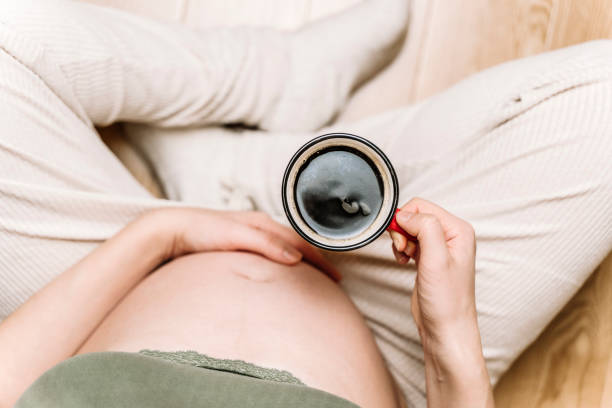Tea, Coffee, and Caffeine Consumption During Pregnancy
As in normal times, drinking tea and coffee during pregnancy is a great pleasure for many people. For some people, drinking tea and coffee has become an indispensable habit. Tea and coffee are consumed almost every day to stay fit, increase energy or just accompany a nice and pleasant conversation, but you should not forget that tea and coffee can cause serious problems and damage due to the amount of caffeine they contain. Excessive caffeine consumption during pregnancy can create irreversible consequences for the baby’s health.
Caffeine Consumption During Pregnancy

Caffeine is found in the seeds and leaves of most plants found in nature. Almost every day, most people consume caffeine with beverages such as tea, coffee, and cola. Caffeine consumption during pregnancy occurs through many different foods and beverages or by drinking tea and coffee during pregnancy. When caffeine found in nature is taken into the body with food and beverages, it quickly passes into the blood and goes to the baby through the placenta.
When expectant mothers take 200 mg of caffeine into their bodies by drinking tea and coffee or eating something, the current in the placenta, which sends blood to the baby, decreases by 25% and caffeine passes to the baby. Important problems and dangers that expectant mothers should not ignore begin at this point. The metabolism, which is found in expectant mothers and provides caffeine breakdown, is not found in the baby and placenta. For this reason, caffeine, which cannot be destroyed by the placenta, can be found at a high rate in the baby. The metabolic characteristics of the mother-to-be directly affect the amount of caffeine passed to the baby, but at the same time, the metabolism of caffeine may differ in individuals by being affected by genetic and environmental factors such as nicotine. A mother who can metabolize caffeine quickly and a mother who can metabolize it very hard, even if they take the same amount of caffeine, the amount of caffeine passed to their babies may be different.
Every Milligram of Caffeine Reduces Baby’s Weight!
Growth retardation and various ailments are seen in the babies of expectant mothers who drink tea and coffee during pregnancy in heavy amounts for a long time. It is very difficult to predict how and how the amount of caffeine taken will affect the development of the baby. The fact that the expectant mother varies according to individual, metabolic, environmental, and genetic factors makes it very difficult to predict.
In a scientific study based on tea and coffee consumption during pregnancy, it was determined that there was a 60 or 70 g decrease in the baby’s weight in 200 mg caffeine intake per day. In the same study, the weights of the babies of expectant mothers who took 300 mg of caffeine a day before pregnancy but reduced this amount to 50 mg during pregnancy and those of mothers who continued their caffeine intake with 300 mg were compared. A serious decrease in the weight of the babies of the mothers who did not reduce their caffeine consumption during pregnancy, such as 160 g, was determined. Another issue that comes to the fore is that as caffeine consumption increases, growth retardation increases proportionally in the baby. As a result, each mg of caffeine affects the development of the baby negatively.
Two Enemies of Baby’s Healthy Development Process: Caffeine and Alcohol
Caffeine taken from tea and coffee consumption during pregnancy causes developmental delay in the baby, similar to alcohol intake. In addition, taking both alcohol and caffeine together increases the negative effect on the baby. The intake of nicotine in the body also exacerbates this effect. It is known that cigarettes and tea and coffee are frequently consumed in the world in general, so expectant mothers should pay attention to this situation.
Tea and Coffee Consumption During Pregnancy Impairs Iron Absorption!
The need for iron increases considerably during pregnancy. One of the negative effects of caffeine emerges at this point. Caffeine taken with tea and coffee consumption during pregnancy reduces iron absorption by 40% during pregnancy. In short, the iron requirement of the expectant mother is hindered by caffeine.
- Coffee is not the only product that provides caffeine intake. Coffee provides approximately 20% or 40% of the daily amount of caffeine taken.
- There is approximately 10 – 50 mg of caffeine in 60 grams of tea. After tea, chocolate, cola, and soft drinks follow as caffeine content.
Green Tea Isn’t Innocent either!
It is the healthiest way to look at the caffeine content of foods and beverages consumed daily. For example, there is a substantial amount of caffeine in green tea. For this reason, every expectant mother should review her eating and drinking habits. The expectant mother should considerably reduce the amount of caffeine consumption during pregnancy.
Average caffeine ratios of foods and beverages are listed as follows
- A cup of filter coffee = 135 – 200 mg of caffeine
- One cup of espresso = 100 mg of caffeine
- One cup of cappuccino = 100 mg of caffeine
- A cup of Turkish coffee = 57 mg of caffeine
- A can of cola = 30 -56 mg of caffeine
- 100 gr milk chocolate = 20 mg caffeine
- A can of soft drink = 50 mg of caffeine
As a result, caffeine taken together with tea and coffee consumption during pregnancy is a very active substance for the development of the baby during pregnancy. Increasing caffeine consumption during pregnancy leads to negative situations and developmental delay problems in the baby. For this reason, expectant mothers should pay attention to what they eat and drink.
